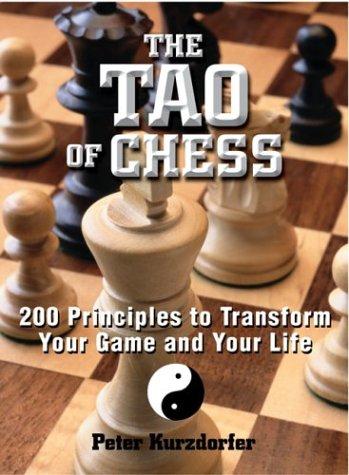Tomasino reviewed The tao of chess by Peter Kurzdorfer
Review of 'The tao of chess' on 'Goodreads'
1 star
I love eastern philosophy. I really love chess. One would figure that this book would hit some magical combo-zone and have me praising and sharing it with all my friends. Unfortunately, The Tao of Chess fails on the most important parts.
I'll admit it, the premise is fantastic. I've felt for a while that chess carries enough complexity to warrant numerous metaphors worthy of contemplation. In fact, I've already begun picking apart aspects of chess to use as a martial arts structure in my novel. Perhaps this is the same line of thinking that lead Peter Kurzdorfer to write this book. Honestly, I think the idea can work well, he just didn't pull it off here.
You see, Mr. Kurzdorfer writes as a man who knows his chess aphorisms well, as a player who can show you games to illustrate a point, as a Master of the game. What he …
I love eastern philosophy. I really love chess. One would figure that this book would hit some magical combo-zone and have me praising and sharing it with all my friends. Unfortunately, The Tao of Chess fails on the most important parts.
I'll admit it, the premise is fantastic. I've felt for a while that chess carries enough complexity to warrant numerous metaphors worthy of contemplation. In fact, I've already begun picking apart aspects of chess to use as a martial arts structure in my novel. Perhaps this is the same line of thinking that lead Peter Kurzdorfer to write this book. Honestly, I think the idea can work well, he just didn't pull it off here.
You see, Mr. Kurzdorfer writes as a man who knows his chess aphorisms well, as a player who can show you games to illustrate a point, as a Master of the game. What he does not do is write as a student of Tao.
Each of the 200 chess "principles" is followed by a short explanation. Often he cites a game to illustrate the reasoning behind it. Finally, the author gives us a sentence or two attempting to connect the chess principle into real life. Unfortunately, these connections are shallow at best, often completely missing the point. Rather than spend a few paragraphs describing the emotional state of the game, the psychology of position, the depth and beauty of the constant ebb-and-flow that makes up every single game, he chose to say things like, "Successful people go after what they want, and in that they resemble successful rooks. Unsuccessful people don't go after what they want nor do they freely interact with others. In that way, they resemble unsuccessful rooks."
Not only does this type of insight fail to capture anything worthwhile that might arise from the chess principle of placing rooks on open files, (No mention of clearing your paths before putting your strongest forward efforts into something? How about the idea of looking for openings and opportunities to strike fully? Or maybe you can think of it less aggressively as an acknowledgement of your most peaceful path.) he instead chooses to blurt out a ridiculous claim that has no basis in anything. Unsuccessful people don't interact freely with others? What on earth is that about? It's meaningless and downright wrong.
Perhaps if he had titled this book: The Superficial Life Metaphors of Chess, I would have been more satisfied. Though I'd be hard pressed to find even that level of usefulness in here.

